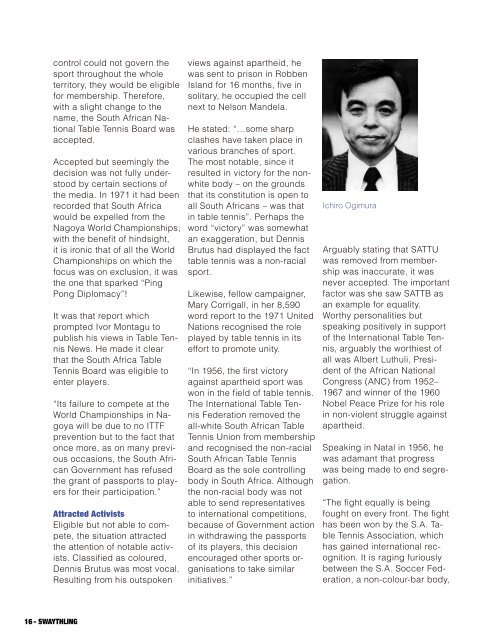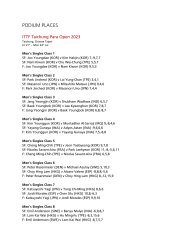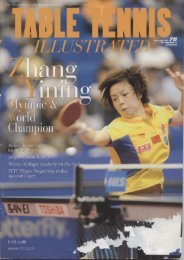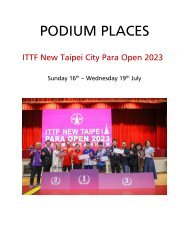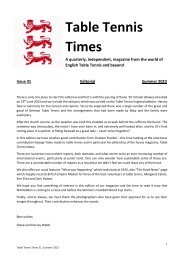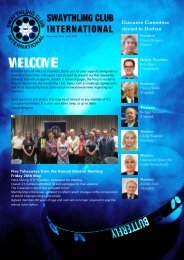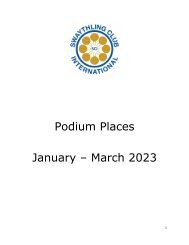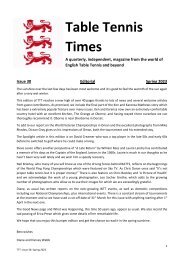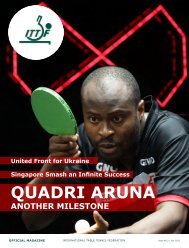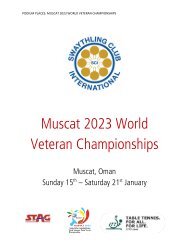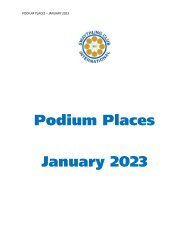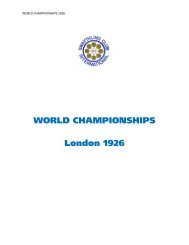Swaythling_Mag_112-1 (2023_04_26)
You also want an ePaper? Increase the reach of your titles
YUMPU automatically turns print PDFs into web optimized ePapers that Google loves.
control could not govern the<br />
sport throughout the whole<br />
territory, they would be eligible<br />
for membership. Therefore,<br />
with a slight change to the<br />
name, the South African National<br />
Table Tennis Board was<br />
accepted.<br />
Accepted but seemingly the<br />
decision was not fully understood<br />
by certain sections of<br />
the media. In 1971 it had been<br />
recorded that South Africa<br />
would be expelled from the<br />
Nagoya World Championships;<br />
with the benefit of hindsight,<br />
it is ironic that of all the World<br />
Championships on which the<br />
focus was on exclusion, it was<br />
the one that sparked “Ping<br />
Pong Diplomacy”!<br />
It was that report which<br />
prompted Ivor Montagu to<br />
publish his views in Table Tennis<br />
News. He made it clear<br />
that the South Africa Table<br />
Tennis Board was eligible to<br />
enter players.<br />
“Its failure to compete at the<br />
World Championships in Nagoya<br />
will be due to no ITTF<br />
prevention but to the fact that<br />
once more, as on many previous<br />
occasions, the South African<br />
Government has refused<br />
the grant of passports to players<br />
for their participation.”<br />
Attracted Activists<br />
Eligible but not able to compete,<br />
the situation attracted<br />
the attention of notable activists.<br />
Classified as coloured,<br />
Dennis Brutus was most vocal.<br />
Resulting from his outspoken<br />
views against apartheid, he<br />
was sent to prison in Robben<br />
Island for 16 months, five in<br />
solitary, he occupied the cell<br />
next to Nelson Mandela.<br />
He stated: “…some sharp<br />
clashes have taken place in<br />
various branches of sport.<br />
The most notable, since it<br />
resulted in victory for the nonwhite<br />
body – on the grounds<br />
that its constitution is open to<br />
all South Africans – was that<br />
in table tennis”. Perhaps the<br />
word “victory” was somewhat<br />
an exaggeration, but Dennis<br />
Brutus had displayed the fact<br />
table tennis was a non-racial<br />
sport.<br />
Likewise, fellow campaigner,<br />
Mary Corrigall, in her 8,590<br />
word report to the 1971 United<br />
Nations recognised the role<br />
played by table tennis in its<br />
effort to promote unity.<br />
“In 1956, the first victory<br />
against apartheid sport was<br />
won in the field of table tennis.<br />
The International Table Tennis<br />
Federation removed the<br />
all-white South African Table<br />
Tennis Union from membership<br />
and recognised the non-racial<br />
South African Table Tennis<br />
Board as the sole controlling<br />
body in South Africa. Although<br />
the non-racial body was not<br />
able to send representatives<br />
to international competitions,<br />
because of Government action<br />
in withdrawing the passports<br />
of its players, this decision<br />
encouraged other sports organisations<br />
to take similar<br />
initiatives.”<br />
Ichiro Ogimura<br />
Arguably stating that SATTU<br />
was removed from membership<br />
was inaccurate, it was<br />
never accepted. The important<br />
factor was she saw SATTB as<br />
an example for equality.<br />
Worthy personalities but<br />
speaking positively in support<br />
of the International Table Tennis,<br />
arguably the worthiest of<br />
all was Albert Luthuli, President<br />
of the African National<br />
Congress (ANC) from 1952–<br />
1967 and winner of the 1960<br />
Nobel Peace Prize for his role<br />
in non-violent struggle against<br />
apartheid.<br />
Speaking in Natal in 1956, he<br />
was adamant that progress<br />
was being made to end segregation.<br />
“The fight equally is being<br />
fought on every front. The fight<br />
has been won by the S.A. Table<br />
Tennis Association, which<br />
has gained international recognition.<br />
It is raging furiously<br />
between the S.A. Soccer Federation,<br />
a non-colour-bar body,<br />
and the S.A.F.A. which is for<br />
Whites only. We congratulate<br />
our sportsmen for upholding<br />
the dignity of the Non-White<br />
peoples of this country.”<br />
Legislation Repealed<br />
Setting an example, equally<br />
table tennis provided a respite<br />
for the incarcerated ANC<br />
members. Following the end<br />
of apartheid, England’s Stuart<br />
Sweeney visited the museum<br />
in Robben Island; one artefact<br />
was an inmate’s account<br />
that an overseas charity had<br />
provided a table tennis table<br />
and a book on how to play the<br />
game. Pride of place in his<br />
cell was a handcrafted certificate<br />
recording the fact he was<br />
runner up in the prison tournament.<br />
A continual fight to end segregation;<br />
sadly in 1984 Ivor<br />
Montagu passed away but the<br />
policies of the ITTF remained<br />
unchanged regarding South<br />
Africa. Between 1987 and<br />
1993, the National Party entered<br />
into negotiations with the<br />
African National Congress. In<br />
1990, prominent ANC figures<br />
such as Nelson Mandela were<br />
released from prison, apartheid<br />
legislation was repealed<br />
on Monday 17th June 1991,<br />
multiracial elections were organised<br />
in April 1994.<br />
Soon after the repeal, on Sunday<br />
21st July, members of<br />
SATTB and SATTU signed a<br />
declaration to the effect that<br />
SATTB would become the<br />
governing body for table tennis.<br />
Proceedings were ratified<br />
George Segun<br />
by Hans Giesecke (ITTF Executive<br />
Committee Member<br />
– Finance), George Segun<br />
(President of the African Table<br />
Tennis Federation) and Fikrou<br />
Kidane (Special Advisor to the<br />
International Olympic Committee<br />
on Africa Affairs).<br />
South Africa returned to international<br />
sport. At the Barcelona<br />
1992 Olympic Games,<br />
the ITTF awarded wild cards<br />
to Louis Botha, an SATTU<br />
member and Cheryl Roberts<br />
from the SATTB. Each finished<br />
in fourth place in their initial<br />
stage groups. In the men’s singles<br />
Botha concluded matters<br />
behind Poland’s Andrzej Grubba,<br />
Brazil’s Claudio Kano and<br />
Czechoslovakia’s Roland Vimi.<br />
Similarly, in the women’s singles,<br />
Cheryl Roberts who had<br />
started to play table tennis in<br />
a neighbour’s garage, having<br />
been excluded from a “whites<br />
only” tennis club, finished next<br />
in line to China’s Qiao Hong,<br />
Hans Giesecke<br />
Italy’s Alessia Arisi and Germany’s<br />
Elke Schall.<br />
Later, in 1994, the International<br />
Olympic Committee, recognising<br />
Ping Pong Diplomacy,<br />
invited Ichiro Ogimura, the<br />
ITTF President at the time and<br />
representatives from SATTB<br />
to attend the IOC Centennial<br />
Olympic Congress in Paris; the<br />
theme “Olympic Movement and<br />
International Understanding”.<br />
The invitation acknowledged<br />
the efforts of the International<br />
Table Tennis Federation in the<br />
stance against segregation.<br />
Suggesting that table tennis<br />
was responsible for massive<br />
changes in South African life<br />
would be gross exaggeration<br />
but most certainly the sport<br />
played its part, in certain respects<br />
it led the way.<br />
Thanks to Chuck Hoey (ITTF Museum<br />
Curator), Stuart Sweeney and Table Tennis<br />
England in the production of this article<br />
16 - SWAYTHLING SWAYTHLING - 17


